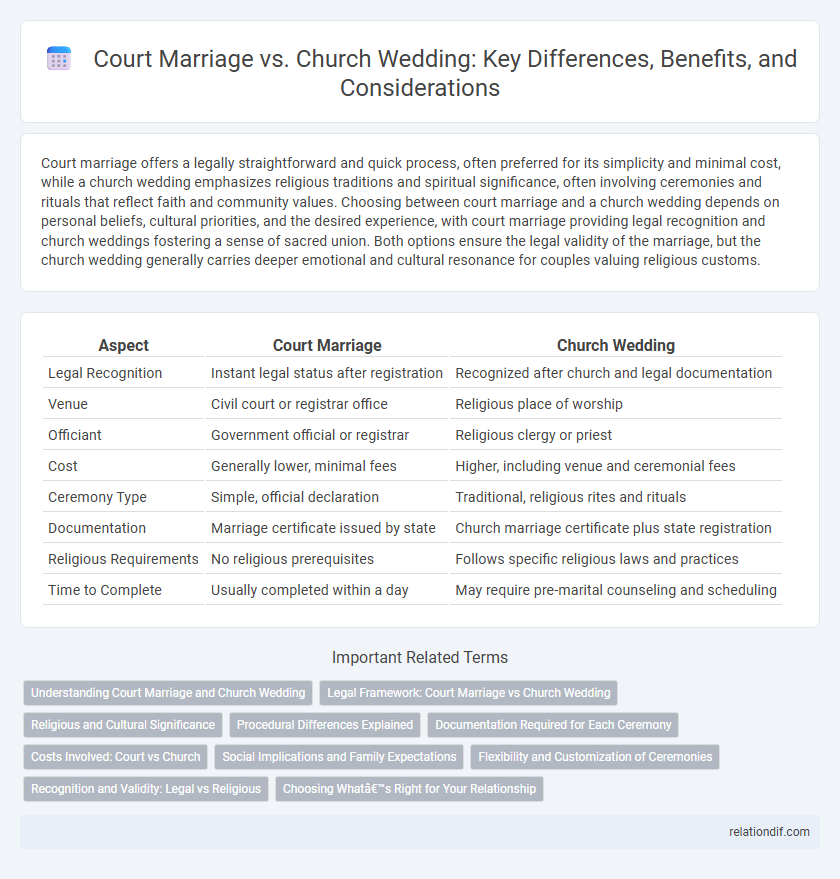Court marriage offers a legally straightforward and quick process, often preferred for its simplicity and minimal cost, while a church wedding emphasizes religious traditions and spiritual significance, often involving ceremonies and rituals that reflect faith and community values. Choosing between court marriage and a church wedding depends on personal beliefs, cultural priorities, and the desired experience, with court marriage providing legal recognition and church weddings fostering a sense of sacred union. Both options ensure the legal validity of the marriage, but the church wedding generally carries deeper emotional and cultural resonance for couples valuing religious customs.
Table of Comparison
| Aspect | Court Marriage | Church Wedding |
|---|---|---|
| Legal Recognition | Instant legal status after registration | Recognized after church and legal documentation |
| Venue | Civil court or registrar office | Religious place of worship |
| Officiant | Government official or registrar | Religious clergy or priest |
| Cost | Generally lower, minimal fees | Higher, including venue and ceremonial fees |
| Ceremony Type | Simple, official declaration | Traditional, religious rites and rituals |
| Documentation | Marriage certificate issued by state | Church marriage certificate plus state registration |
| Religious Requirements | No religious prerequisites | Follows specific religious laws and practices |
| Time to Complete | Usually completed within a day | May require pre-marital counseling and scheduling |
Understanding Court Marriage and Church Wedding
Court marriage is a legally recognized union conducted by a government official, emphasizing legal documentation and civil rights without religious ceremonies. Church wedding involves a religious ritual performed by clergy in a place of worship, focusing on spiritual vows and adherence to religious traditions. Both forms offer distinct validation--court marriage ensures state legality, while church wedding provides spiritual sanctity.
Legal Framework: Court Marriage vs Church Wedding
Court marriage is legally recognized by the state and provides immediate official documentation such as marriage certificates, essential for legal rights and benefits. Church weddings, while significant culturally and religiously, often require subsequent civil registration to confer full legal status under family law. The legal framework surrounding court marriage is governed by secular laws, ensuring equality and standardized procedures, whereas church weddings follow religious doctrines that might not fully align with state requirements.
Religious and Cultural Significance
Court marriage emphasizes legal recognition and simplicity, providing a secular alternative that prioritizes state-sanctioned rights and documentation. Church weddings hold profound religious significance, often involving sacred rituals, blessings, and adherence to cultural traditions that reinforce communal identity and spiritual commitment. The choice between court marriage and church wedding reflects differing values on the interrelation of law, faith, and cultural heritage in matrimonial ceremonies.
Procedural Differences Explained
Court marriage involves registering the union legally with the government by submitting necessary documents and completing a formal application process, often requiring witnesses and a waiting period. Church weddings focus on religious rituals, requiring prior counseling with clergy, adherence to faith-based procedures, and sacramental ceremonies in accordance with specific religious doctrines. Legal validity in court marriage is immediate upon registration, whereas church weddings may need separate civil registration to be recognized by the state.
Documentation Required for Each Ceremony
Court marriage requires essential documents such as government-issued identification cards, birth certificates, proof of residence, and affidavits of marital status, ensuring legal recognition by civil authorities. Church weddings demand baptismal certificates, confirmation papers, and sometimes pre-marital counseling certificates, reflecting religious prerequisites and ecclesiastical approval. Both ceremonies necessitate official marriage licenses, but the documentation emphasizes legal versus spiritual validation respectively.
Costs Involved: Court vs Church
Court marriages typically involve lower costs, with standard government fees ranging from $50 to $200 depending on the jurisdiction, making it an economical option. Church weddings often incur higher expenses, including donation fees, officiant honorariums, venue charges, and additional costs for decorations and music, which can collectively total several thousand dollars. Couples seeking budget-friendly ceremonies generally prefer court marriages due to the significantly reduced financial burden compared to traditional church weddings.
Social Implications and Family Expectations
Court marriage offers a legally recognized union often accompanied by minimal ceremonial requirements, appealing to couples prioritizing personal choice and simplicity over tradition. Church weddings typically embody religious and cultural significance, fulfilling family expectations and reinforcing social bonds within faith communities. The decision between court marriage and church wedding impacts social perception, with church ceremonies generally perceived as affirming familial legitimacy and adherence to cultural norms.
Flexibility and Customization of Ceremonies
Court marriage offers greater flexibility in scheduling and allows couples to personalize vows and ceremony details without strict religious guidelines. Church weddings follow traditional liturgical structures, often limiting customization but providing a deeply symbolic and spiritual experience. Couples seeking tailored ceremonies with adaptable timing typically prefer court marriages over the fixed rituals of church weddings.
Recognition and Validity: Legal vs Religious
Court marriage provides legal recognition and validity under the jurisdiction of the state, ensuring the marriage is officially registered and enforceable for civil rights and benefits. Church weddings hold religious significance and spiritual validation within specific faith communities but may require additional civil registration to gain legal status. Both forms impact the social and cultural acknowledgment of marriage, yet only court marriage guarantees compliance with national marriage laws.
Choosing What’s Right for Your Relationship
Choosing between court marriage and a church wedding depends on personal beliefs, legal preferences, and cultural values. Court marriage offers a faster, legally binding process with minimal rituals, ideal for couples prioritizing simplicity and official recognition. A church wedding provides a spiritual ceremony rooted in tradition, appealing to those who value religious significance and communal celebration.
Court Marriage vs Church Wedding Infographic

 relationdif.com
relationdif.com